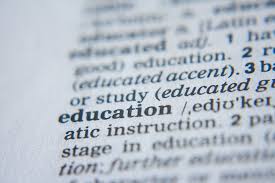In a recent opinion piece at The 74, Robin Lake casts off the label of educator reformer, arguing that “to imply that they are some monolithic group of reformers is ridiculous.” I agree, not so much because education reform has lost its meaning but because it never had a single definition in the first place. At the heart of reform is an acknowledgement that the educational system isn’t serving all kids well, but agreeing that the system could be improved is far from agreeing on how to get there.
 To some people “education reform” is about holding schools and districts accountable for student outcomes, which can be viewed as either a means of ensuring that society doesn’t overlook subgroups of students, or as a top-down approach that fails to account for vast differences in school and community resources. To others education reform is shorthand for increasing school choice, or requiring students to meet specific academic standards to be promoted or graduate from high school, or revising school discipline practices that disproportionately impact students of color. Each of these ideas has supporters and detractors, and I suspect that many people who are comfortable with one type of reform vehemently disagree with another.
To some people “education reform” is about holding schools and districts accountable for student outcomes, which can be viewed as either a means of ensuring that society doesn’t overlook subgroups of students, or as a top-down approach that fails to account for vast differences in school and community resources. To others education reform is shorthand for increasing school choice, or requiring students to meet specific academic standards to be promoted or graduate from high school, or revising school discipline practices that disproportionately impact students of color. Each of these ideas has supporters and detractors, and I suspect that many people who are comfortable with one type of reform vehemently disagree with another.
To take a specific example, consider teacher evaluation reform. One challenge in debating this particular education reform is that there are multiple ways teacher evaluation could change outcomes: one way is by providing feedback and targeted support to educators; another is the identification and removal of low-performing teachers. So even when “education reform” types favor a policy, they might have very different views on the mechanisms through which that policy achieves its goals. In the case of teacher evaluation reform, the dueling mechanisms created trade-offs in evaluation design, as described by my Bellwether colleagues here. (As they note, in redesigning evaluation systems, states tended to focus on the reliability and validity of high-stakes measures and the need for professional development plans for low performing teachers, devoting less attention to building the capacity of school leaders to provide meaningful feedback to all teachers.)
I personally agree with those who argue that teacher evaluation should be used to improve teacher practice, and I have written previously about what that might look like and about the research on evaluation’s role in developing teachers. In a more nuanced conversation, we might acknowledge that there are numerous outcomes we care about, and that even if a given policy or practice is effective at achieving one outcome — say, higher student achievement — it might have unintended consequences on other outcomes, such as school climate or teacher retention.
Instead of broadly labeling people as “education reformers,” we need to clearly define the type of reform we’re discussing, as well as the specific mechanisms through which that reform achieves its intended goals. Doing so provides the basis for laying out the pros and cons of not just the overall idea, but of the policy details that transform an idea into action. Such specificity may help us avoid the straw man arguments that have so often characterized education policy debates.
December 12, 2018
All I Want for Christmas Is for People to Stop Using the Phrase “Education Reform”
By Bellwether

Share this article
More from this topic
Meeting the Moment: How 4 Philanthropic Foundations Are Stepping Up Right Now
Teaching Interrupted: How Federal Cuts Threaten a Promising Teacher Residency Program
Does Increasing Graduation Requirements Improve Student Outcomes?
No results found.